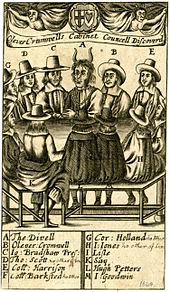Wikipedia:Reference desk/Archives/Language/2023 August 27
| Language desk | ||
|---|---|---|
| < August 26 | << Jul | August | Sep >> | August 28 > |
| Welcome to the Wikipedia Language Reference Desk Archives |
|---|
| The page you are currently viewing is a transcluded archive page. While you can leave answers for any questions shown below, please ask new questions on one of the current reference desk pages. |
August 27
[edit]Colon used for name separation
[edit]
I can't find any information to indicate that Word dividers were used in 17th century English. However, I am aware that the practice of punctuating a name is popular within Sovereignty movements, such as ':David-Wynn: Miller', ':Given-name :Family-name', and ':Given-name;'.
Therefore, does anyone know why the names on the illustration titled 'Olever Cromwells Cabinet Councell Discoverd' has colons separating the names? — Preceding unsigned comment added by Mattmill30 (talk • contribs) 17:44, 27 August 2023 (UTC)
- This was originally posted to Talk:Colon (punctuation) but has no relevance to improving the Colon (punctuation) article, it's someone's pet research question, so I'm moving it here. Will drop them a user-talk note that it's been moved. — SMcCandlish ☏ ¢ 😼 18:33, 27 August 2023 (UTC)
A colon was sometimes used where we would use a full stop; I seem to recall that Dr. Johnson was known to abbreviate his name as Sam: Johnson. --Orange Mike | Talk 19:35, 27 August 2023 (UTC)
- Our article colon (punctuation) says "Early Modern English texts also used colons to mark abbreviations", but cunningly it says this in a section about the use of the colon in languages other than English. DuncanHill (talk) 20:03, 27 August 2023 (UTC)
Use of a colon as an abbreviation mark makes sense in all but labels 'A' and 'B', because neither 'The:Divell' or 'Olever:Cromwell' are abbreviated. But the colon also isn't being used as a word divider for 'Hugh Peters'. Mattmill30 (talk) 21:09, 27 August 2023 (UTC)
- Also in case of Pres:, it's unambiguously an abbreviation mark and not a word divider. 82.166.199.42 (talk) 11:45, 28 August 2023 (UTC)
- I don't disagree that in some cases a colon is being used as an abbreviation mark, but I am questioning what additional use it is serving for labels 'A' and 'B' which don't contain abbreviations as 'The:Divell' and 'Olever:Cromwell' respectively. Mattmill30 (talk) 12:53, 28 August 2023 (UTC)
- It might be useful to consult illustrated catalogues of coins, for example the inscription on the obverse of the florin was ELIZABETH.II.DEI.GRATIA.REGINA, but on the sovereign ELIZABETH.II.DEI.GRATIA.REGINA.F:D:. 2A02:C7B:229:3400:907D:F7C9:9140:71C6 (talk) 12:59, 28 August 2023 (UTC)
- Earlier florins (amongst other British coins) are more liberal with their colons. In 1909 there is Edwardus VII D: G: BRITT: OMN: REX F:D: IND: IMP:, although the subsequent 1932 uses interpuncts: FID·DEF IND·IMP 1932·ONE FLORIN. The last predecimal penny included + ELIZABETH·II·DEI·GRATIA·REGINA·F:D:, but the previous queen seemed not amused by colons: VICTORIA·DEI·GRATIA·BRITT·REGINA·FID·DEF·IND·IMP·. In the case of these coins, at least, thought ought to be given to the various marks being used for aesthetic reasons in addition to, or instead of, having a grammatical meaning. Bazza (talk) 13:24, 28 August 2023 (UTC)
- Could the colons in labels 'A' and 'B' serve to concatenate/encapsulate the identifier for a Title or Trust?
- For example 'the Devil' is a title of Satan and, after being appointed as Lord Protector, Oliver Cromwell began to sign his name as 'Oliver P' Mattmill30 (talk) 13:47, 28 August 2023 (UTC)
- It might be useful to consult illustrated catalogues of coins, for example the inscription on the obverse of the florin was ELIZABETH.II.DEI.GRATIA.REGINA, but on the sovereign ELIZABETH.II.DEI.GRATIA.REGINA.F:D:. 2A02:C7B:229:3400:907D:F7C9:9140:71C6 (talk) 12:59, 28 August 2023 (UTC)
